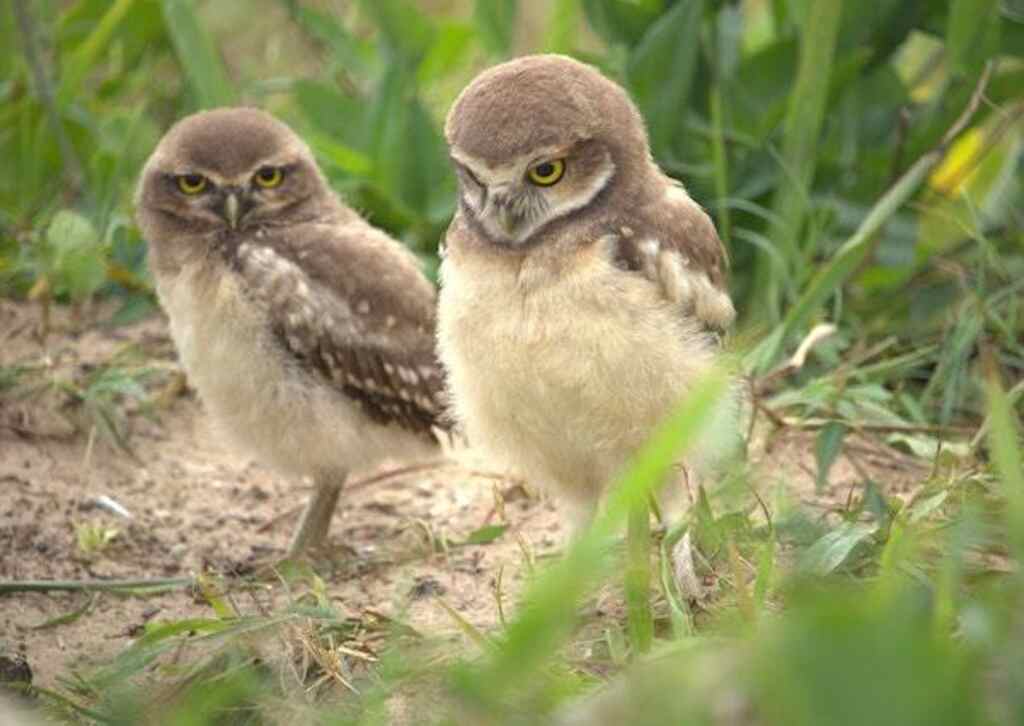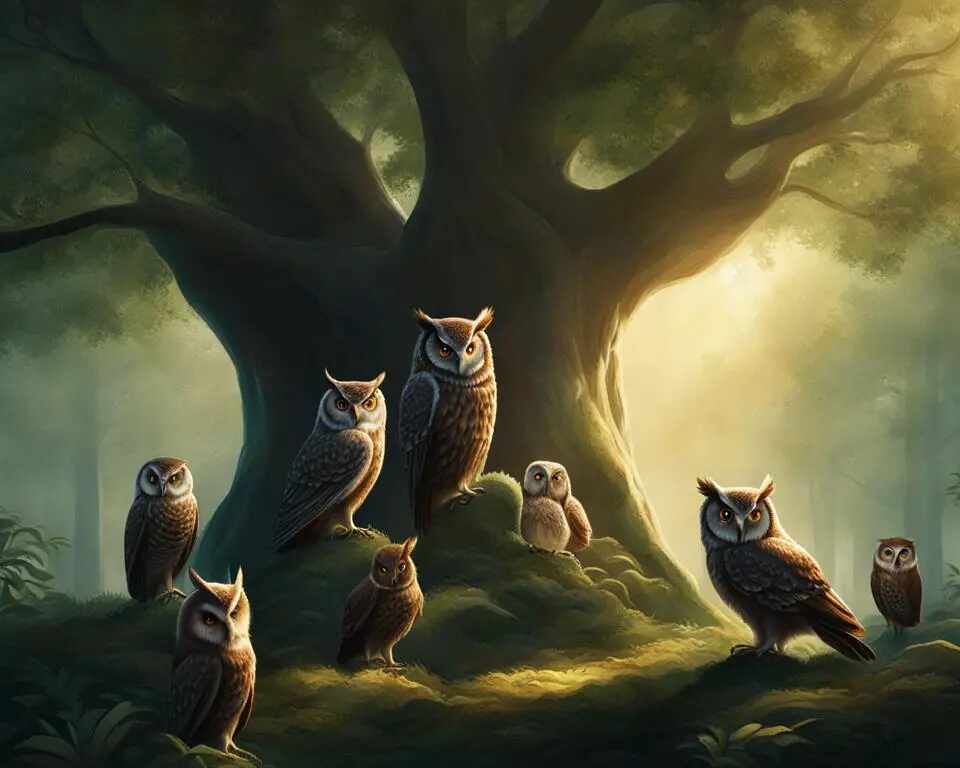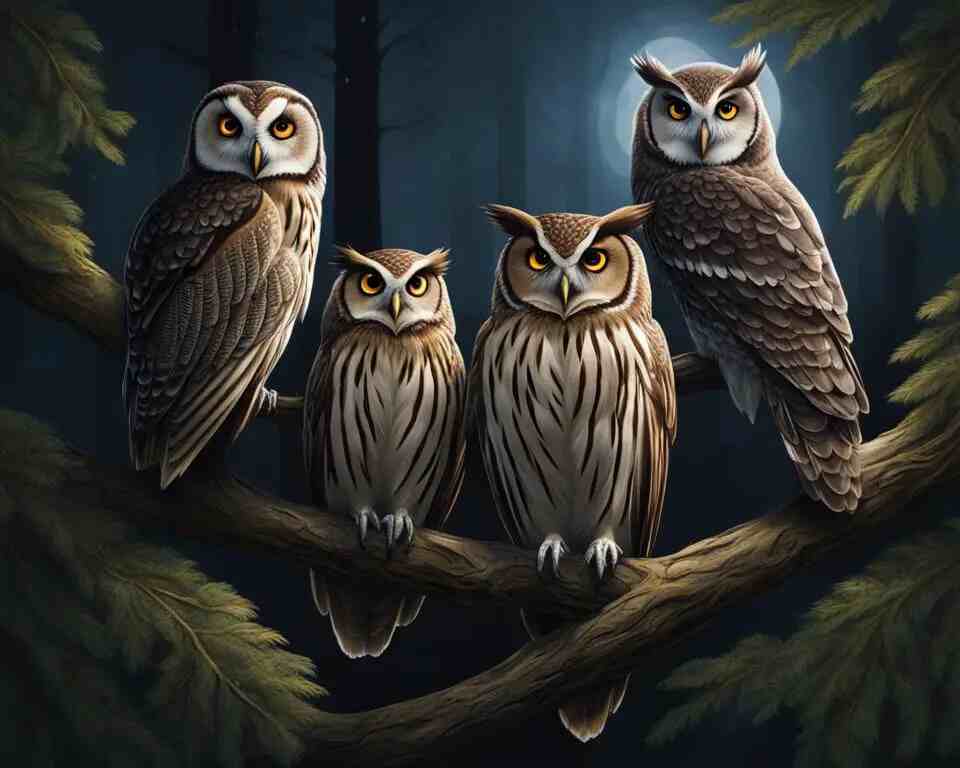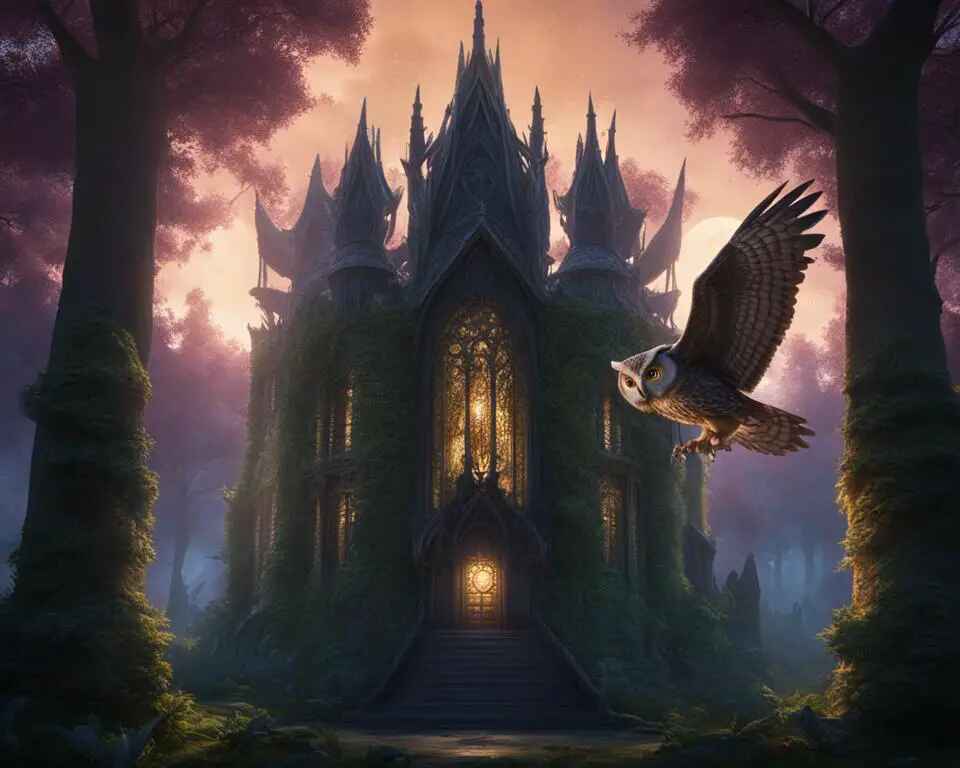In the vast world of nature, there are many fascinating creatures with unique characteristics and behaviors. Among these magnificent beings are owls, known for their silent flight and haunting calls. Owls are typically solitary birds, rarely seen in groups.
However, when multiple owls do come together, they are referred to by a special name. Ever wondered, ‘What is a group of owls called?’ In this article, we will explore the enchanting world of owl groupings and delve into the reasons behind their intriguing group names.
Table of Contents
- 1 Key Takeaways:
- 2 Unveiling the Mystery: What Is a Group of Owls Called?
- 3 The Enigmatic Parliament: Exploring Owl Group Terminology
- 4 Owl Congregations in the Wild
- 5 Conclusion
- 6 FAQs:
- 6.1 Are there other poetic names for owl gatherings?
- 6.2 What is the origin of the term “parliament” for owl groups?
- 6.3 What impact did literature have on popularizing owl group names?
- 6.4 Do owls flock together often?
- 6.5 What is the social structure of owl communities?
- 6.6 What can we learn from the behavior of owls in groups?
- 7 Source Links
- 8 Author
Key Takeaways:
- Owls are solitary birds, but they do have group names when spotted together.
- Understanding owl group terminology adds to the allure of these magnificent birds.
- The term “parliament” is commonly used to describe a group of owls.
- Other poetic names like congress, stare, and hooting are also used for owl gatherings.
- The influence of literature, particularly the works of C.S. Lewis and Geoffrey Chaucer, plays a role in popularizing these names.
Unveiling the Mystery: What Is a Group of Owls Called?
A group of owls is commonly called a parliament. However, there are other poetic names used to describe gatherings of owls. The term “parliament” likely originated from C.S. Lewis’s book series, The Chronicles of Narnia, where he referred to a group of owls as a parliament.
Additionally, Geoffrey Chaucer’s poem, “Parlement of Foules,” may have contributed to the popularity of this term. Besides parliament, there are other less common names for owl gatherings.
Exploring the origins and literary influences behind these names adds to the fascination of owl group terminology.
The Origins of Term “Parliament”
The term “parliament” has become synonymous with a group of owls, but its origins can be traced back to literary influences. C.S. Lewis, in his beloved book series, referred to owls as a parliament, emphasizing their wisdom and intellect. This imagery contributed to the adoption of the term in the context of owl gatherings.
Other Poetic Names for Owl Gatherings
While “parliament” is the most commonly used name for a group of owls, there are other poetic names that evoke the mysterious nature of these birds. These names include “congress,” “stare,” and “hooting.” Each name captures a different aspect of owl behavior and characteristics, further adding to the allure of owl groupings.
The Literary Influence of C.S. Lewis
C.S. Lewis’s portrayal of owls as a parliament in The Chronicles of Narnia has had a significant impact on the popular perception of owl gatherings. Lewis’s vivid imagination and ability to create enchanting worlds have made the term “parliament” synonymous with a group of owls, evoking a sense of wonder and intrigue.
Chaucer’s “Parlement of Foules” and its Legacy
Geoffrey Chaucer, known as the father of English literature, also contributed to the development of owl group terminology.
In his poem “Parlement of Foules,” written in the 14th century, Chaucer refers to a gathering of birds, including owls, as a parliament.
This literary reference adds a historical dimension to the use of the term and highlights the enduring influence of Chaucer’s work.
The Enigmatic Parliament: Exploring Owl Group Terminology
The Origins of Term “Parliament”
The term “parliament” is commonly used to refer to a group of owls. It likely originated from the symbolism associated with owls as wise and intelligent creatures. Owls have long fascinated humans with their mysterious nature and nocturnal habits. The use of the term “parliament” adds an air of mystique to these captivating birds.
Other Poetic Names for Owl Gatherings
In addition to “parliament,” there are several other poetic names used to describe gatherings of owls. These names often highlight specific owl characteristics or behaviors. Some of the other names include:
- Congress: This name emphasizes the sense of order and collaboration among owls.
- Stare: Referring to a group of owls as a “stare” reflects their piercing and intense gaze, which is characteristic of these birds.
- Hooting: This term draws attention to the distinct hooting sound made by owls, which serves as a means of communication within their group.
Each of these names adds a touch of poetic beauty to the description of owl gatherings, showcasing the richness and diversity of language.
The Literary Influence of C.S. Lewis
In his books, Lewis portrayed owls as wise and knowledgeable creatures, often depicting them in group settings referred to as parliaments.
This literary influence has contributed to the widespread usage of the term in describing owl gatherings.
Chaucer’s “Parlement of Foules” and its Legacy
Geoffrey Chaucer, the renowned English poet of the Middle Ages, wrote a poem titled “Parlement of Foules” (Parliament of Birds).
While the poem primarily refers to various bird species, its use of the word “parliament” to describe a gathering of avian creatures may have indirectly influenced the association of this term with owls.
Chaucer’s literary legacy continues to resonate, leaving a lasting impact on the way we perceive and describe collective groups of animals.
| Owl Group Name | Meaning |
|---|---|
| Parliament | Symbolizes the wisdom and intelligence associated with owls |
| Congress | Emphasizes the order and collaboration observed in owl gatherings |
| Stare | Reflects the intense and piercing gaze of owls |
| Hooting | Highlights the unique hooting sound made by owls as a means of communication |
Owl Congregations in the Wild
While owls are typically solitary creatures, there are occasions when they come together in groups, forming what is known as an owl congregation. These gatherings provide a unique opportunity to observe the social behavior and dynamics of these fascinating birds.
Occasions When Owls Flock Together
One of the main occasions when owls flock together is outside of the breeding season. During this time, multiple owls may gather in a particular area, creating an owl colony or assemblage.
This congregation serves various purposes, such as better protection against predators, increased chances of finding food, and establishing territory boundaries.
Social Structure of Owl Communities
Owls have distinct social units within their congregations. These groups can vary in size and composition depending on the species and environmental factors.
Owl social units may include mated pairs, families with offspring, and non-breeding individuals. Each member plays a specific role in the community, contributing to its overall functioning and survival.
Understanding Owl Behavior in Groups
Studying owl congregations provides valuable insights into owl behavior and communication. Observing them in groups can help researchers understand their vocalizations, hunting techniques, and social interactions.
Additionally, studying owl communities sheds light on the species-specific adaptations and strategies they employ for survival in diverse habitats.
Conclusion
In conclusion, the unique group names for owls, particularly the term “parliament,” add an air of mystery and enchantment to these nocturnal birds. The origins of these names, influenced by literature and symbolism, further deepen the intrigue surrounding owl group terminology.
While owls are primarily solitary birds, the rare occasions when they come together in groups provide invaluable insights into their social structure and behavior. Exploring the fascinating world of owl gatherings allows us to shed light on the complex dynamics of these magnificent creatures.
As nature enthusiasts, we are captivated by the wonder of these owl congregations, as they spark our curiosity and appreciation for the beauty of the natural world. Studying owl collective nouns in the field of ornithology is not only academically intriguing but also contributes to our understanding of wildlife and nature as a whole.
FAQs:
Are there other poetic names for owl gatherings?
Yes, besides parliament, other poetic names for owl gatherings include congress, stare, and hooting.
What is the origin of the term “parliament” for owl groups?
The term “parliament” likely originated from the symbolism of owls as wise and intelligent creatures. It may also have been influenced by C.S. Lewis’s book series, The Chronicles of Narnia, and Geoffrey Chaucer’s poem, “Parlement of Foules.”
What impact did literature have on popularizing owl group names?
Literature, particularly the works of C.S. Lewis and Geoffrey Chaucer, played a role in popularizing owl group names such as parliament. Their writings portrayed owls as wise and mysterious creatures, contributing to the fascination surrounding these terms.
Do owls flock together often?
No, owls are typically solitary birds. However, there are occasions when they come together in groups, particularly outside of the breeding season.
Owl communities often have a hierarchical structure, with dominant individuals occupying prime territory and asserting their dominance over subordinate owls.
What can we learn from the behavior of owls in groups?
Studying the behavior of owls in groups provides insights into their complex social dynamics, including communication, hunting strategies, and cooperative breeding behaviors.





